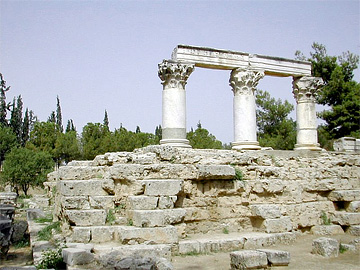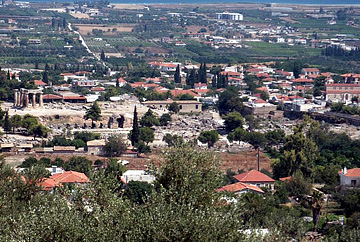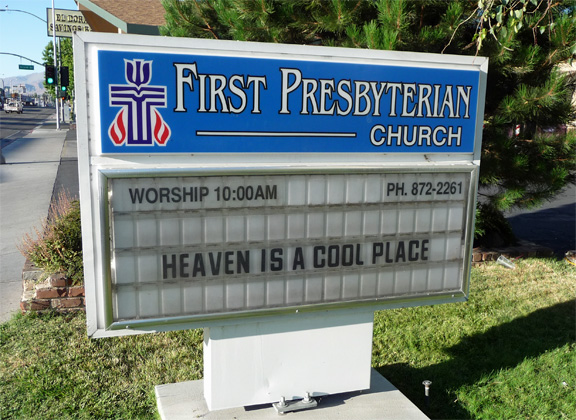In my last post I set up the first-century Corinthian church as a paradigm of a church in conflict. The letter we know as 1 Corinthians is the effort of the Apostle Paul to resolve the controversies that were plaguing this early Christian community.
Before we get into some of the specifics of this effort, however, we should look at how Paul addresses the Corinthians at the beginning of his letter. He writes to: “the church of God that is in Corinth.” “Church” translates the Greek word ekklesia, which meant “gathering” or “assembly,” and referred in particular to the gathering of voting citizens in Corinth. Paul wasn’t writing to the “ekklesia of Corinth,” a phrase that would easily have been misunderstood. Instead, he addressed his letter to the “ekklesia of God that is in Corinth.” (Photo: The temple of Octavia in Corinth)
 By referring to the Corinthian church as the church “of God,” Paul is doing more than distinguishing it from the civic voting assembly, however. He is also letting the Corinthians know who “owns” the gathering of Christians in Corinth. In a phrase: God does. The Christians are not simply one more religious club formed and guided by its members, of which there were many in first-century Corinth. Rather, the Corinthian assembly belongs to God in a strong, ultimate sense. (Later in the letter Paul will add that even the bodies of the individual Corinthians also belong to the Lord.)
By referring to the Corinthian church as the church “of God,” Paul is doing more than distinguishing it from the civic voting assembly, however. He is also letting the Corinthians know who “owns” the gathering of Christians in Corinth. In a phrase: God does. The Christians are not simply one more religious club formed and guided by its members, of which there were many in first-century Corinth. Rather, the Corinthian assembly belongs to God in a strong, ultimate sense. (Later in the letter Paul will add that even the bodies of the individual Corinthians also belong to the Lord.)
Paul reiterates this point at the conclusion of his opening address: “God is faithful; by him you were called into the fellowship of his Son, Jesus Christ our Lord” (1:9). Notice, first of all, that the Corinthian believers aren’t in the fellowship because they chose to join. From a theological point of view, they “were called” by God into the fellowship. They are members of the Corinthian church by God’s choice and invitation. Moreover, they belong not merely to a human institution, but to a fellowship that has been founded by and is the property of the very Son of God.
Twice in his opening address to the Corinthians, Paul emphasizes the fact that their gathering is not their own. It belongs to God the Father and to the Son of God. Later Paul will explain that the church comes into existence through the work of the Spirit of God (see 12:12-13). This is a fundamental truth about the church, and one Paul emphasizes intentionally because it relates to the problem of conflict among Christians.
To relate Paul’s point to the situation of conflict among Christians today, let me say this: when you’re caught up in a disagreement with other believers, you need to remember whose you are. You belong to God through Jesus Christ. This is true of you personally and also of the church. Whatever else it may be, the church is the church of God: the church that comes from God, is governed by God, and belongs to God.
So, if you’re in a fight with other believers that relates to a particular church, one of the first things you need to remember is that the church is not yours. It doesn’t belong to you. It doesn’t belong to the people who are on your side. It doesn’t belong to the majority of the members. It doesn’t belong to the founding members or their descendents. It doesn’t belong to the big givers. It doesn’t belong to the pastor, or the elders, or even the denomination (if there is one). Your individual church belongs to the triune God. Period. Every other “ownership” is really just a loan.
This basic truth makes a huge difference in the way we think and act with respect to the church, especially in times of conflict. For example:
• If we truly believe that the church belongs to God, then we’ll be more committed to finding God’s solution to our conflicts than making sure that our side wins.
• If we truly believe that the church belongs to God, then we’ll be quick to admit that our personal ideas about what should happen in the church may very well be wrong. Only one opinion really matters, the opinion that belongs to God.
• If we truly believe that the church belongs to God, then we’ll realize that the church is not to be trifled with. The church is not first of all a vehicle for my self-expression, or professional security, or enjoyment, or whatever. It is, first and foremost, a vehicle for God’s glory. The church exists to do God’s bidding, to represent God’s kingdom, and to bring praise to God.
I can’t emphasize enough how important it is for us to remember to whom the church belongs and, for that matter, to whom we belong. When I’ve was in the middle of a passionate argument with my elders at Irvine Presbyterian Church, for example, one of the best things we did is to stop and pray. As we care before God, we remembered that we were on holy ground. We relinquished our desire to control God’s church and submitted ourselves to his will. Before the majesty of God, we humbled ourselves and shared together in common humility. Such an experience of God’s sovereignty didn’t magically take away our disagreements, but it did put them in a completely different light. Antagonists vying for ownership of the church became fellow seekers for the will of the One who truly owns the church. Winning no longer mattered, except for the victory of God.
This process that I’ve just described happened several times throughout my ministry at Irvine Pres, though it usually didn’t flow as quickly or smoothly as the last paragraph would imply. Nevertheless, I’ve seen the recognition that the church is God’s church transform hearts, including my own. So, one of the most important things we can do if we’re in the middle of church conflict is to step back and remember – really remember – that the church belongs to the triune God.

